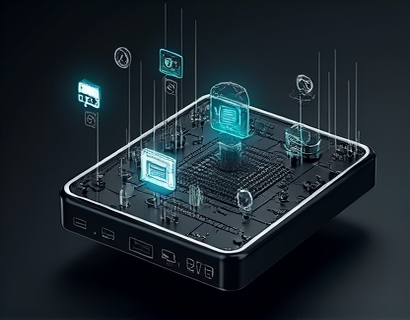AI-Driven Personalized Healthcare: Revolutionizing Access to Expert Insights and Reliable Information
In the rapidly evolving landscape of healthcare, the integration of artificial intelligence (AI) is transforming the way individuals access and utilize medical information. An AI-driven platform stands at the forefront of this revolution, offering users instant personalized medical insights and expert advice. This technology not only empowers individuals to make informed health decisions but also enhances overall well-being through advanced technology and timely support. The purpose of this article is to delve into the transformative impact of AI in personalized healthcare, exploring how it is reshaping the way we approach medical information and expert guidance.
The Need for Personalized Healthcare
Traditional healthcare models often struggle to provide personalized attention due to the sheer volume of patients and the complexity of individual health needs. This has led to a growing demand for healthcare solutions that cater to the unique requirements of each person. AI-driven personalized healthcare addresses this gap by leveraging vast amounts of data, machine learning algorithms, and natural language processing to deliver tailored medical insights and advice. This approach ensures that users receive information and guidance that is relevant to their specific health conditions, lifestyle, and preferences.
How AI-Driven Platforms Work
AI-driven healthcare platforms operate by collecting and analyzing a wide range of data points, including medical history, lifestyle factors, genetic information, and real-time health metrics. These platforms use advanced algorithms to process this data and generate personalized recommendations. For instance, a user with a chronic condition like diabetes can input their blood glucose levels, diet, and exercise routine, and the AI system will provide tailored advice on managing their condition effectively. This level of personalization is unprecedented in traditional healthcare settings and significantly enhances the quality of care.
Instant Access to Expert Insights
One of the most significant advantages of AI-driven personalized healthcare is the instant access to expert insights. Users can receive timely advice from medical professionals without the delays associated with scheduling appointments or waiting for responses. This immediate access to expert guidance is particularly valuable for acute health issues or when users need quick reassurance about their symptoms. The AI system can simulate a conversation with a healthcare expert, providing evidence-based advice and directing users to appropriate resources or further consultations if necessary.
Reliable and Trustworthy Information
In the digital age, the proliferation of health information online has led to a flood of misinformation and conflicting advice. AI-driven platforms combat this issue by ensuring that the information provided is not only personalized but also reliable and trustworthy. These platforms are designed to filter and verify information from credible sources, such as peer-reviewed journals, reputable medical institutions, and official health guidelines. Users can trust the advice they receive, knowing it is grounded in scientific evidence and best practices.
Enhancing User Engagement and Education
AI-driven healthcare platforms are not just about providing advice; they are also powerful tools for educating users about their health. Through interactive features and personalized content, these platforms help users understand their conditions, treatment options, and preventive measures. For example, a user with heart disease can access detailed explanations of their condition, learn about the latest research, and understand the importance of lifestyle changes. This educational component empowers users to take an active role in their health management, leading to better outcomes and improved quality of life.
Integration with Wearable Devices and Health Apps
The integration of AI-driven healthcare platforms with wearable devices and health apps further enhances their effectiveness. By connecting with devices like smartwatches and fitness trackers, these platforms can monitor real-time health metrics such as heart rate, sleep patterns, and physical activity. This continuous data stream allows the AI system to provide more accurate and timely insights, adjusting recommendations based on the user's current health status. For instance, if a user's heart rate spikes during exercise, the AI can offer immediate advice on pacing and recovery.
Personalized Treatment Plans and Medication Management
AI-driven platforms can also play a crucial role in creating and managing personalized treatment plans. By analyzing a user's medical history, current health data, and treatment responses, the AI can suggest optimized treatment regimens. This is particularly beneficial for complex conditions that require precise dosing and monitoring. Additionally, these platforms can assist with medication management, reminding users when to take their medications and tracking adherence. This level of support is especially valuable for individuals managing multiple chronic conditions.
Mental Health Support and Emotional Well-Being
The impact of AI-driven personalized healthcare extends beyond physical health to mental and emotional well-being. These platforms can offer resources and advice for managing stress, anxiety, and depression. By using natural language processing, AI systems can detect signs of mental distress in user interactions and provide appropriate interventions, such as mindfulness exercises, breathing techniques, or recommendations for professional help. This holistic approach ensures that users receive comprehensive support for all aspects of their health.
Building Trust Through Transparency and Explainability
To gain user trust, AI-driven healthcare platforms must prioritize transparency and explainability. Users should understand how the AI arrives at its recommendations and have access to the data and logic behind these insights. This transparency builds confidence in the system and encourages users to engage more deeply with the platform. By providing clear explanations and allowing users to review and adjust their data inputs, these platforms foster a collaborative relationship between the user and the AI system.
Challenges and Considerations
While the potential of AI-driven personalized healthcare is immense, there are several challenges and considerations that must be addressed. Privacy and data security are paramount, as sensitive health information must be protected from breaches and misuse. Compliance with regulations such as HIPAA in the United States and GDPR in Europe is essential. Additionally, the accuracy and reliability of AI algorithms must be rigorously tested and validated to ensure they provide safe and effective advice. Continuous monitoring and updates are necessary to maintain the highest standards of care.
Future Prospects and Innovations
The future of AI-driven personalized healthcare is promising, with ongoing advancements in technology poised to enhance its capabilities. The integration of genomics, precision medicine, and advanced imaging techniques will further refine personalized recommendations. Machine learning models will become more sophisticated, enabling even more accurate predictions and insights. The potential for AI to predict health issues before they arise, through predictive analytics, could revolutionize preventive care. As these innovations unfold, the role of AI in healthcare will continue to expand, offering unprecedented levels of personalized support and empowerment.
Conclusion
AI-driven personalized healthcare represents a significant leap forward in how we access and utilize medical information. By providing instant expert insights and reliable guidance, these platforms empower individuals to make informed health decisions and enhance their overall well-being. The integration of advanced technology with healthcare not only improves the quality of care but also fosters a more engaged and educated user base. As the field continues to evolve, the potential for AI to transform healthcare is vast, offering a brighter and more personalized future for all.










































